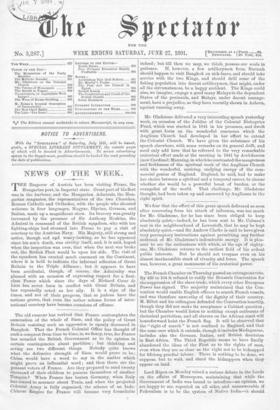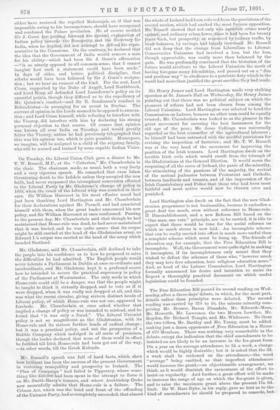Lord Ripon on Monday raised a serious debate in the
Lords on the affairs of Muneepore, maintaining that while the Government of India was bound to interfere—an opinion, we are happy to see, repeated on all sides, and unanswerable if Federalism is to be the system of Native India—it should either have restored the expelled Maharajah, or, if that was impossible owing to his incompetence, should have recognised and condoned the Palace revolution. He of course scolded Sir J. Gorst for putting forward his cynical explanation of Indian policy towards the Senaputty, and the Secretary for India, when he replied, did not attempt to defend his repre- sentative in the Commons. On the contrary, he declared that the idea that the Government of India would remove a man for his ability—which had been Sir J. Gorst's affirmation —"is so utterly opposed to all common-sense, that I cannot imagine how such a statement could have been made." In days of older, and better, political discipline, that rebuke would have been followed by Sir J. Gorst's resigna- tion; but we hear no rumour of the kind. For the rest, Lord Cross, supported by the Duke of Argyll, Lord Northbrook, and Lord Reay, all defended Lord Lansdowne's policy on its essential points, though they differed as to the expediency of Mr. Quinton's conduct—and Sir R. Sandeman's conduct in Beloochistan—in arranging for an arrest in Durban The current of opinion in the Lords seemed to be opposed to annexa- tion; and Lord Cross himself, while refusing to interfere with the Viceroy, did interfere with him by declaring his strong personal objection to that course. Of course that opinion was known all over India on Tuesday, and would greatly fetter the Viceroy, unless he had previously telegraphed that this was his opinion too, which is quite possible. Muneepore, we imagine, will be assigned to a child of the reigning family, who will be nursed and trained by some capable Indian Vizier.



































